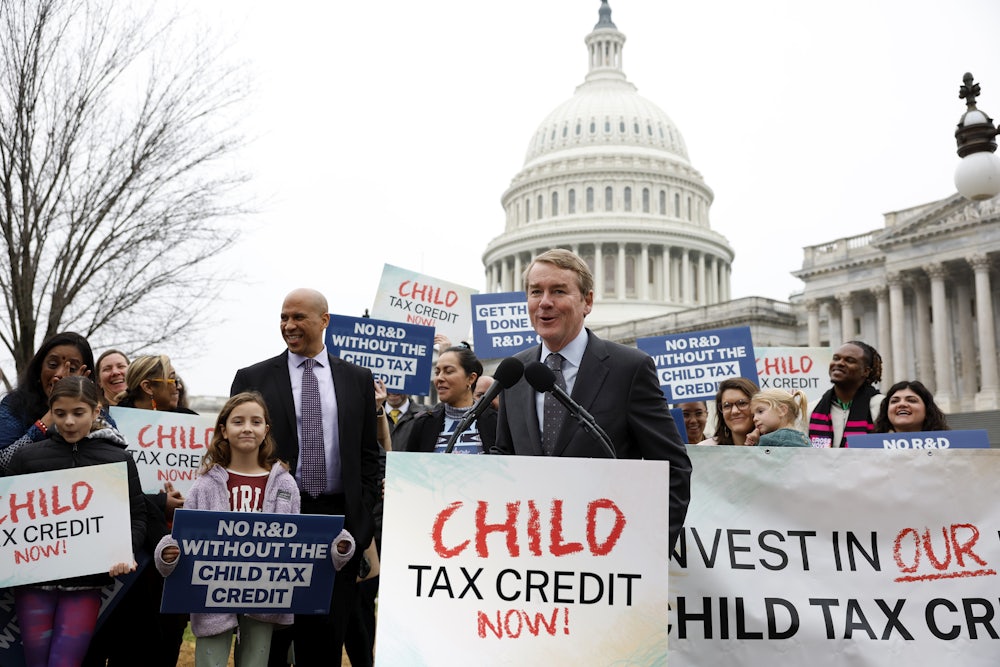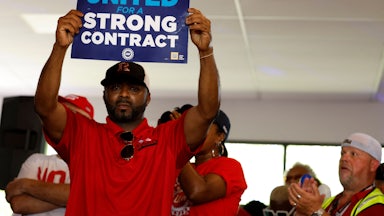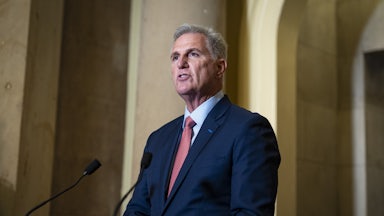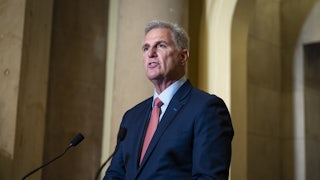With new data showing that the child poverty rate jumped dramatically in 2022, Democrats in Congress are pressing forward with their perhaps quixotic effort to reinstate the expanded child tax credit. Implemented in the second half of 2021, the credit contributed to a significant cut in child poverty that year.
But the newly released census data showed that child poverty shot back up—more than doubling from 2021 to 2022—after the provision expired at the end of 2021. In that brief period of time it climbed from a historic low of 5.2 percent to 12.4 percent.
“We have now proved something pretty phenomenal and, at the same time, pretty obscene,” Senator Cory Booker said Wednesday. “What we’ve proved is that poverty for children in America is not some accident, it’s a policy choice.” He spoke in a press conference conducted by the so-called “CTC Six,” the half-dozen legislators who have been pushing for the credit’s renewal. These senators and representatives see themselves not as beating a dead horse but rather beating the drum for the low-income families who benefited from the credit—and are now feeling its absence.
The expanded credit was a key provision of the American Rescue Plan, the nearly $2 trillion coronavirus-relief legislation passed by Congress in the spring of 2021. The law increased the amount of the credit and disbursed it on a monthly basis rather than in a lump sum at tax time. And for the first time it made the credit accessible to households too poor to pay income taxes. Data shows that the expanded credit lifted millions of children out of poverty and helped reduce food insecurity in low-income households. Poor Americans primarily used the monthly payment for basic necessities, such as groceries, utilities, and rent.
Republican lawmakers unilaterally opposed expanding the credit in the first place and then extending it. Conservative Democratic Senator Joe Manchin, who voted for the American Rescue Plan, also opposed extending the expanded credit. When congressional Democrats passed the Inflation Reduction Act, a significant climate and tax policy bill, in July 2022—crafted with significant input from Manchin—it did not include the expanded child tax credit.
The West Virginia senator appeared largely unfazed by the new census data on child poverty. “It’s deeper than [the expanded credit], we all have to do our part,” Manchin told Semafor on Tuesday. “The federal government can’t run everything.”
Senator Mitt Romney—who has proposed his own child allowance legislation that is in some ways more generous than the expanded child tax credit implemented by the American Rescue Plan—echoed that sentiment, indicating that the increase in child poverty was to be expected. “When you cut off government payments, there’s going to be a reduction in payments received,” Romney told me, somewhat elliptically, on Tuesday.
Still, since its expiration nearly two years ago, supporters of the credit have tried to keep it on the front burner: They tried to include the expanded credit in an end-of-year government funding bill last December, without success. And then Democratic lawmakers in both chambers reintroduced legislation over the summer to reinstate it.
Democrats also continue to attempt to leverage reimplementation of the expanded credit in exchange for extending a popular research and development tax credit, although this strategy has not yet succeeded. (Republicans say the one issue should not affect the other, noting that support for the R&D credit has historically been bipartisan.)
Democrats insist that there is room for bipartisanship on the issue—after all, the Republican Tax Cuts and Jobs Act of 2017 expanded the amount of the child tax credit—but several sticking points remain for GOP lawmakers.
Republicans have pointed to the cost of the expanded credit, although some experts argue the returns on it would be 10 times the price tag. “That’s incredibly short-sighted, because there is a cost to doing nothing,” Representative Suzan DelBene said of Republican cost concerns.
GOP lawmakers, and Manchin, have also expressed concern about its accessibility to low- or no-income Americans, arguing that it should be connected to work requirements. Representative Kevin Hern, the chair of the conservative Republican Study Committee in the House, argued that such requirements would help parents return to the workforce.
“There has to be some kind of work requirement associated with that so that child tax credit can be given, so that a parent can go to work,” he said. “Otherwise, they’re staying at home.”
Republicans also point to inflation and government spending for the increase in child poverty. “What you’re hearing from the American people is that inflation is killing them,” Hern said. “Real wages are down, disposable incomes are down. There’s less you can do for your children, and then it keeps you at the poverty level.” Although real wages are beginning to rebound in the wake of the pandemic, poorer Americans are still struggling to catch up financially.
Representative Jodey Arrington, the chair of the House Budget Committee, also blamed inflation for the increase in child poverty. “There is a tax on poor people. That’s all inflation is. It’s all this government spending on all these things that somehow, some people think the American people want and need, and the price is being paid by the people who can least afford it,” Arrington argued. (Data from the consumer price index released on Wednesday showed that inflation increased in August due to higher gas prices, but economists predict that this rise is temporary.)
The expanded child tax credit’s supporters argue, however, that it would help low-income families manage higher costs rather than boosting prices. A Tuesday report by the Center on Poverty and Social Policy at Columbia University estimated that, adjusted for inflation, the child poverty rate would have been at 8.1 percent in 2022 if the expanded child tax credit had remained in place. The report also found that more than five million more children would be out of poverty today, and the child poverty rate would be 47 percent lower, if the expanded credit had stayed in effect.
Supporters also point to research that shows the expanded credit had little or no impact on poor Americans’ employment.
“Frankly, it is insulting to families to suggest parents are going to quit their jobs for $3,000 or $3,600. They are not, and the data is there to back it up,” Representative Rosa DeLauro said at Wednesday’s press conference, referring to the increased amount of the expanded child tax credit.
To some extent, Republicans and Democrats may always disagree on the best method for addressing child poverty. To oversimplify the matter: One believes government spending can decrease poverty, and one believes it can only worsen it. But despite the two parties’ philosophical differences—and even those within the Democratic Party—the expanded credit’s supporters in Congress insist that the data will sway opponents to their side.
“The benefits to America are extraordinary,” Senator Michael Bennet said at Wednesday’s press conference. “You know, the idea that the richest country in the world wouldn’t want to end childhood poverty for its own sake defies my imagination.” He also noted that some conservatives have expressed support for some version of an expanded credit.
There has been some movement on the issue; in July, a Senate subcommittee held a hearing on the historically bipartisan support for the child tax credit. Nevertheless, Romney said that there have been no new developments in conversations with his Democratic counterparts.
“I’ve got nothing to report,” Romney told me. A version of his bill introduced in 2021 did not include work requirements, but a second version introduced the following year did. Romney’s bill is also considered a nonstarter with Democrats in part because of its funding sources, such as a provision to eliminate the state and local tax deduction.
Still, Democrats remain optimistic that—eventually—they can reinstate the expanded credit, particularly by continuing to play hardball on extending tax credits supported by Republicans. “I just think we have a real opportunity now, because people know that this group of people is not going to support tax benefits for corporations or for the wealthiest people in this country if we don’t invest in the child tax credit in a meaningful way,” Bennet said.










